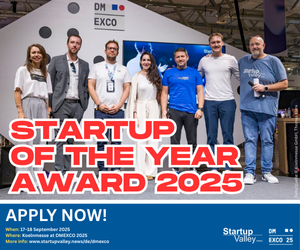The search for funding and partnership marks the beginning of the serious phase of life for many entrepreneurs. The success of their own project often hinges on whether an investor can be enthused by their ideas or not. It is therefore crucial to understand the perspective of the other side and adapt to their wishes and needs. This does not mean that every desire has to be anticipated and a strategy of ingratiating oneself is required. On the contrary, most people cannot relate to such approaches, and they can even have a very negative effect. However, it is also not harmful to ask oneself what someone who consciously takes risks to invest in a young company might expect. We have done the only sensible thing and directly asked such individuals.
Money isn’t everything
Surprisingly, our interviewees attach little importance to the topic of money. While it is always appreciated if a path towards profitability is already apparent, it is rarely a prerequisite for investment. Most investors are well aware that startups primarily incur costs in the early years, and ultimately, they want to contribute their own expertise to transform a good idea into a sustainable business model. However, this doesn’t have to happen overnight.
Wanja S. Oberhof, CEO of The Social Chain AG, emphasizes that founders should have a solid understanding of their own numbers. These numbers don’t necessarily have to be extraordinary at the time of investment. However, they should be complete and at least indicate the right direction. Every startup must be aware that a healthy business model and, consequently, reliable long-term profits are among the top objectives for investors. Therefore, being unaware of one’s own revenue figures is almost a cardinal sin. Dreams and good intentions are of no use when it comes to hard numbers. However, they have their place in other aspects.
Love it, change it or leave it
Investors unanimously emphasized the importance they place on the motivation of founders when selecting their investments. Nils Glagau, well-known from the TV show “Die Höhle der Löwen” (Shark Tank), is a prime example in this regard. According to the owner of Orthomol, startups must have a burning passion for their cause. Merely discussing a new product that is to be unleashed on the market without genuine enthusiasm is not enough. To impress investors, one must exhibit passion and an unwavering determination to make their startup a success.
It is also helpful in this regard not to undersell oneself or aim too low. After all, it does not demonstrate personal conviction if one’s idea is intended to create only local attention. To convince investors of the opportunities an investment holds, the motto is “think big.” At Speedinvest, only companies with global potential are generally considered for closer evaluation. With that in mind, the professional abilities of female and male founders also come into focus.
It’s all about the basics
Fluent English is now an absolute prerequisite for entrepreneurs. After all, it’s not unlikely to encounter an investor who is less familiar with the German language, even in German-speaking countries. Aside from that, every great idea has the potential to transcend national borders, and those in charge must communicate accordingly.
In addition to language skills, expertise in one’s own specialized field is always highly valued. At Speedinvest, potential partners always take note of founders who are knowledgeable about the industry and ideally have already worked in it. For GoStudent CEO and co-founder Felix Ohswald, a clear distribution of strengths within the company is also important. Participants with knowledge from different areas can leverage their strengths together and unlock particularly high potential. Ohswald much prefers this approach to what he refers to as “three economists.”
Ultimately, the basics for startups also include the business plan, which every potential investor will scrutinize. It should be comprehensive without getting lost in less interesting details. It’s often a balancing act that is not so easy to achieve. Nils Glagau emphasizes the importance of extensive market research, which allows for a realistic assessment of the chances of one’s own ideas.
As mentioned earlier, founders don’t have to promise the moon to investors. Almost all of our conversation partners value honesty and transparency from entrepreneurs. Ideally, a partnership based on equal footing is established, where more is at stake than just providing (risk) capital.
The human factor
The best investors always stand by a startup’s side, offering advice and support, and they accompany projects with passion and dedication. To make that work, the right chemistry is key. Dr. Georg Kofler and Ralf Dümmel also appreciate this, as they recently made headlines as an investment team planning to take the first company from “Die Höhle der Löwen” (Germany’s Shark Tank) to the DAX.
The business relationship between startups and investors is often compared to a marriage by renowned entrepreneurs. Only if there is a good fit on a personal level can it work in the long run and lead to success for both parties. Of course, the product itself must still be a good fit, but ultimately, founders can only convince investors with a strong overall package and not rely solely on a good idea or personal charm.
However, this applies in both directions, and young entrepreneurs should also ensure that they could work well with an investor. Getting involved with an investor solely for the money can backfire if disagreements arise and disputes put the entire company at risk.
Anything convincing is permitted
When it comes to choosing the right industry, founders are essentially free. None of the investors we surveyed restrict themselves to specific sectors when selecting startups. Whatever shows serious prospects for success and stands on somewhat solid ground is generally welcomed with open arms. Therefore, a newly established company searching for new partners should only have limited concerns about this aspect.
Of course, it is helpful to be in the right place at the right time. Markets always have some sort of hype that attracts attention. There are countless examples, from Bitcoin to cannabis to electric cars. Those who tap into the spirit of the times also tend to find entrepreneurs and other investors more easily, who are willing to join in and gladly participate in future successes.
However, it is probably wise not to blindly follow potentially short-lived trends and instead pursue a business model that can stand on its own feet. As mentioned before, serious investors are primarily interested in ideas that promise attractive business opportunities in one or two decades.
What startups should avoid
Investors have a fairly clear idea not only of their desires and requirements for the positive aspects of a company but also of certain no-gos that founders should avoid at all costs. Nils Glagau primarily counts false promises among them, citing nonexistent patents as an example. In general, he is not fond of withholding information. If he doesn’t trust a startup, he will not invest any money or anything else into it.
Similarly, this is the case at Speedinvest, where the executives fundamentally understand the mistakes that occur in young companies. However, founders should also be able to admit these mistakes in order to achieve a learning effect. For Speedinvest, it would be a big mistake, as previously described, to simply chase after the next hype. That would be the opposite of the disruptive technologies that are preferred investments here. Lastly, errors can also occur in seemingly trivial things like a missing website. If one wants to convince an investor, they must make a good first impression. Without a good website, that is simply not possible in today’s time.
Always be honest and diligent.
At The Social Chain, human error is also considered one of the biggest sources of problems in startups. Ralf Dümmel and Dr. Georg Kofler do not appreciate it when someone does not tell the truth. Problems can and will arise sooner or later in any company. However, they should be addressed and not simply concealed. From the perspective of the investor duo, this is the only way to achieve a collaboration on an equal footing.
For Wanja S. Oberhof, it is also a cardinal sin when an entrepreneur is not fully committed to their project and only pursues it when it suits them. Having a possible Plan B does not necessarily indicate full conviction in one’s own ideas, in his opinion. After all, such a safeguard suggests doubts about the viability of a business idea. These doubts can certainly arise among investors and other outsiders, and they should not be taken lightly. However, if anyone should be completely convinced of a startup, it should be the founder themselves.
According to Felix Ohswald, the biggest shortcoming in startups is almost a bit dry in comparison. The GoStudent CEO considers a poor understanding of numbers as a no-go for founders. Therefore, it is evident that this topic also plays an important role when searching for an investor.
Follow your own path.
It is often exhausting and draining to seek an investor for one’s own project. Additionally, the idea of sharing one’s own baby with another entrepreneur may seem strange to some. However, not everyone is fortunate enough to have an idea that is highly sought after. Most startups will eventually need to approach potential investors and partners with their ideas. Only then is the grand breakthrough possible in today’s time. As mentioned before, a new partner brings more than just a hefty bank account. Often, startups gain access to larger markets through such partnerships, for example, by reaching wholesalers and integrating into distribution networks that newcomers would otherwise struggle to access.
While it may still not be completely impossible to achieve success for a startup through organic growth alone, even in the best case, it requires a lot of patience. There are indeed cases where the lack of investments ultimately led to failure. Therefore, it is a good idea to consider early on the possibility of seeking support from investors for your own idea and to put in the necessary effort.
It has never been easier
The good news is that making your company known and attracting the attention of investors has never been as easy as in the digital age. Often, there are specially designed forms on the relevant websites that can be filled out in just a few minutes. However, this does not mean that one cannot take more time. The best prospects for attracting a highly motivated investor are, of course, when they become aware of the company themselves. But no one should be discouraged if they have not yet appeared on their radar. After all, even the best representatives of this kind cannot know every startup, let alone have an overview of which ones are particularly promising.
In case of doubt, it is therefore a good idea to fill out an application on the investors’ websites or contact them via email and social media. However, it is clear that the first impression is always the most important. Those who can convince directly and concisely with a good idea and a viable concept are much more likely to receive feedback than those who simply request additional capital without providing further details. After all, investors are not banks where founders can easily pick up some venture capital. They are potential business partners on an equal footing and accordingly, they want to be treated that way from day one.
No surprises
In general, the investors’ responses to our questions are not overly surprising. Most of the time, they have very understandable concerns, and the whole process can be pleasantly simplified. When investing in a startup, the main desire is for an honest business relationship on an equal footing, characterized by professionalism and transparency. If these basic requirements are met, along with a fresh and convincing idea, regardless of the industry, the prospects are more than good for having a new partner by the side of one’s own company very soon, who can significantly drive the project forward.
One could almost say that the same things that are important for starting a company itself are also important for convincing investors. Ultimately, this should not really surprise anyone, as those who participate in a startup with money and work naturally expect a corresponding return in the short or long term. Therefore, it may also be good advice to focus on the development of one’s own company with regard to the interests of investors. If it can convince with its core idea and the corresponding figures, founders will not even have to be tempted to promise too much or disappoint expectations in any other way.
Lastly, everyone should remember that investors are also human beings, and most of them are surprisingly approachable. It is easier said than done, but especially during the big pitch, it can be advantageous to relax and passionately talk about one’s own company and, above all, its opportunities. By doing so with the necessary enthusiasm, one quickly wins over the listeners.
Foto/Quelle: stock.adobe.com – Yingyaipumi





















